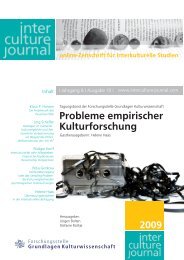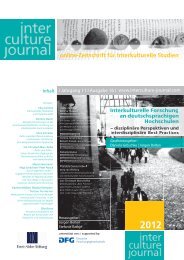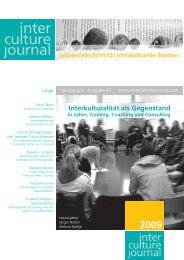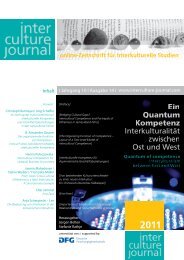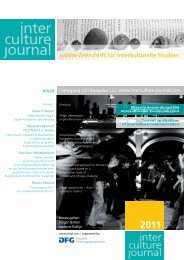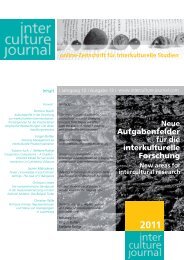Interkulturellen Kompetenz forschung - Frankfurt School of Finance ...
Interkulturellen Kompetenz forschung - Frankfurt School of Finance ...
Interkulturellen Kompetenz forschung - Frankfurt School of Finance ...
Sie wollen auch ein ePaper? Erhöhen Sie die Reichweite Ihrer Titel.
YUMPU macht aus Druck-PDFs automatisch weboptimierte ePaper, die Google liebt.
Mader / Camerer: International English and the Training <strong>of</strong> Intercultural Communicative Competence<br />
competence in English – one now used in some secondary<br />
schools in Germany as well as by chambers <strong>of</strong> commerce in<br />
Germany and Austria. This essay outlines our approach and<br />
the practical answers we suggest.<br />
2. Language - the Source <strong>of</strong> All Misunderstanding<br />
(A. de Saint-Exupéry)<br />
2.1 A Clash <strong>of</strong> Cultures – or is it really?<br />
One example for what we suggest was observed in an intercity<br />
train in Germany, where a German conductor, wishing to<br />
help an Asian passenger with information on where she<br />
should change trains was heard to say to her as the train approached<br />
the station, “You must get out here!” This turn <strong>of</strong><br />
phrase combined with a strong German accent clearly confused<br />
the passenger. The guard was no doubt proud <strong>of</strong> his<br />
ability to communicate in English and the results gained,<br />
when the passenger, albeit rather timidly, left the train as<br />
soon as possible. This situation may perhaps not be considered<br />
as one <strong>of</strong> great importance. The passenger got <strong>of</strong>f the<br />
train and presumably reached her destination. Communication<br />
<strong>of</strong> a sort was achieved. However mutual understanding<br />
between the two protagonists was certainly not achieved as<br />
neither realised what had gone wrong in the encounter and<br />
each undoubtedly remained with their own stereotypical explanations<br />
<strong>of</strong> the other’s behaviour.<br />
Let us examine briefly how this arose and what could have<br />
helped both parties to deal more appropriately with the situation.<br />
Any dictionary will give must as the English translation<br />
<strong>of</strong> the German müssen, and although modern language<br />
teachers are aware <strong>of</strong> the limitations <strong>of</strong> dictionary translation,<br />
probably at no stage <strong>of</strong> his learning <strong>of</strong> English did the conductor<br />
learn that the English use <strong>of</strong> must is not the same as<br />
the German müssen. Although competent speakers <strong>of</strong> English<br />
would all agree that the appropriate instruction would be<br />
something like “I think this is where you have to get <strong>of</strong>f” or<br />
“The next station is where you change trains”, these are not<br />
provided as acceptable equivalents for the entirely appropriate<br />
and by no means brusquely German “Sie müssen hier<br />
aussteigen” in any standard language courses. If a German<br />
conductor were to say “Ich glaube, Sie müssen hier aussteigen”,<br />
he would expose himself as having only a tentative<br />
knowledge <strong>of</strong> the route, i.e. not knowing his job properly.<br />
Had the German conductor been trained to adjust German<br />
discourse strategies to an international setting, the near clash<br />
with the passenger might have been avoided.<br />
© Interculture Journal 2010 | 12 98



